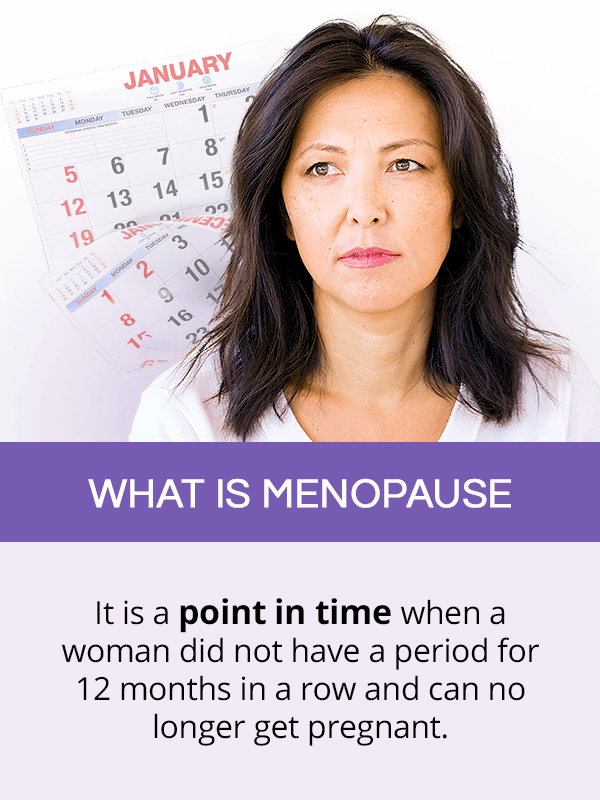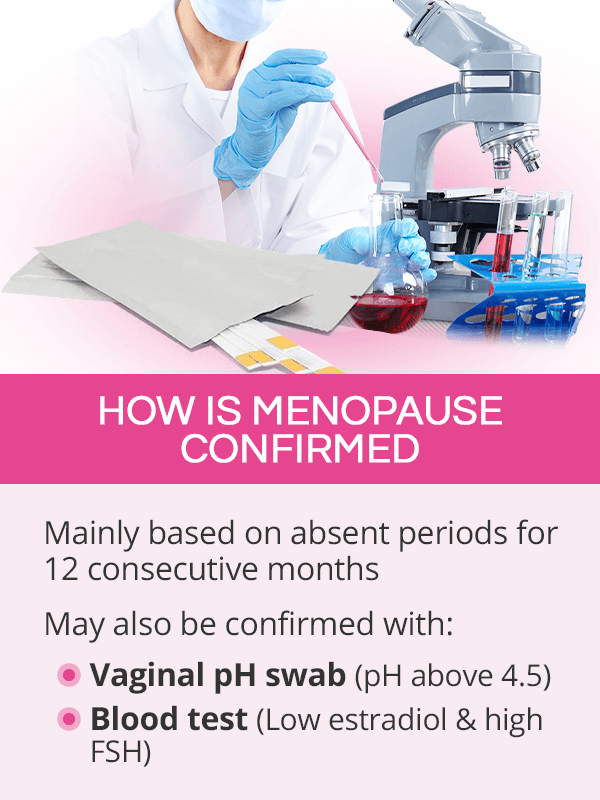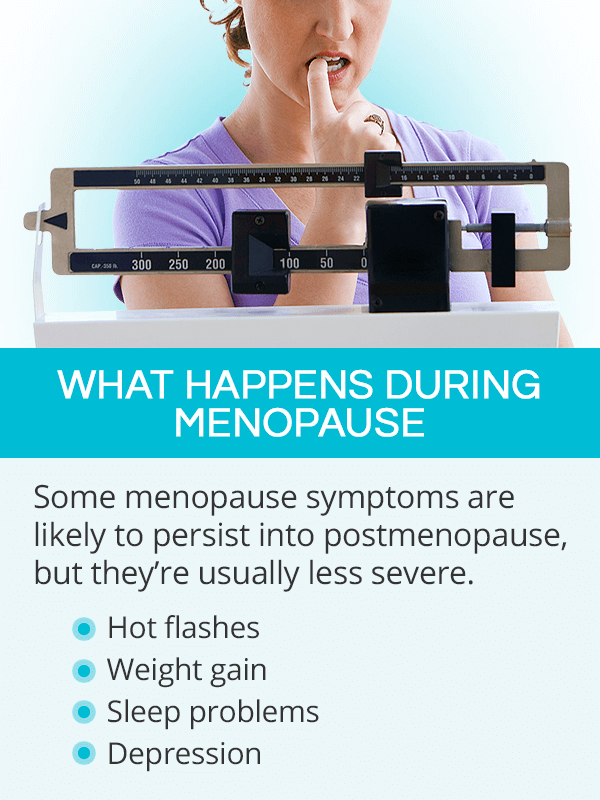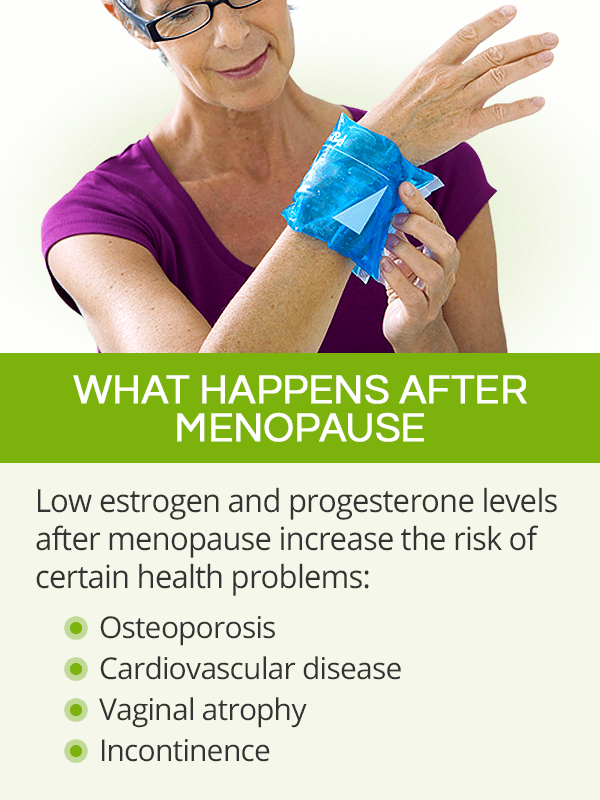What is Menopause?

The official menopause definition is a point in time when a woman did not have menstrual periods for 12 months in a row.1
The stage that covers the years leading up to that date is called perimenopause, and it can last from a few months to over 10 years.2 The years that follow the menopause date are called postmenopause.
What Does It Mean to Have Reached Menopause?
Reaching menopause means that a woman's ovaries no longer contain eggs that could be used for conception. As such, the menopause date marks the end of her fertility. She no longer gets her periods, stops ovulating, and cannot get pregnant.
At What Age Does Menopause Happen?
Women enter natural menopause between the ages of 45 and 55. The average menopause age in the United States is 51.3
However, for a small percentage of women, menopause can come earlier. Such is the case for early menopause, occurring between the ages of 40 and 45, and premature menopause, which is when the final period happens before a woman's 40.4
How is Menopause Confirmed?

For most women past her mid-40s, the absence of periods for 12 months - medically known as amenorrhea - is usually enough to confirm menopause.
Besides a woman's age, clinical history, and amenorrhea, there are several menopause tests that can be ordered to determine whether she, indeed, reached menopause. They include the following:
- Vaginal pH swab: Once women reach menopause, their vaginal pH increases above 4.5. During reproductive years, a normal vaginal pH ranges between 3.8 and 4.5.5
- Blood tests: When ovaries stop their reproductive functions, menopausal women will have high levels of follicle-stimulating hormones (FSH) and low levels of estrogen (most specifically, its form called estradiol). A newly approved PicoAMH Elisa test, which measures Anti-Müllerian hormone levels, can also be used to confirm menopausal status.
If a woman did not have her periods for 12 months before reaching her mid-40s, a doctor may use additional tests to rule out other potential causes leading to menopause-like symptoms, including thyroid disorders.
What Happens During Menopause?

After a woman reaches menopause, some menopause symptoms are likely to continue.
However, their severity is generally much lower than during her peak perimenopausal years.
As aforementioned, she no longer menstruates. Other symptoms that may persist into postmenopause include, but are not limited to, the following:
What Happens After Menopause?

Once it is confirmed that a woman has reached menopause, she enters postmenopause. While she still may be struggling with some symptoms, there more important changes to which she should pay attention.
In postmenopause, estrogen and progesterone remain low. Throughout childbearing years, these reproductive hormones served several key, non-reproductive functions, such as maintaining bone density and supporting cardiovascular health.
As a consequence of their decline, women may face a number of menopause problems, including:
- Osteoporosis. Estrogen loss can lead to osteoporosis, characterized by decreased bone density, making bones prone to fractures.
- Cardiovascular disease. Because of hormonal changes, the levels of low-density lipoprotein (LDL) cholesterol and triglycerides can increase, heightening the risk of developing heart disease after menopause.
- Vaginal atrophy. Low hormone levels may also cause thinning and drying of the vaginal tissue, leading to vaginal dryness and painful sex.
Fortunately, women who have reached menopause can decrease the aforementioned risks and enjoy good health with regular doctor's check-ups, healthy habits, and hormone-balancing supplements, such as Macafem.
Key Takeaways
Reaching menopause means that a woman's reproductive years have ended, which happens around the age of 51, on average. Her ovaries ran out of eggs, causing low estrogen and progesterone levels. As a result, she no longer menstruates, and natural conception is not possible. Some of the symptoms she might have experienced in the years leading to her final period may persist into postmenopause, the subsequent stage. Due to low hormone levels, there are also certain new health risks women may face, such as osteoporosis. By maintaining healthy habits, regular check-ups, and other preventative measures, women can lower the risk of developing serious complications.
Sources
- Cleveland Clinic. (2019). Menopause, Perimenopause and Postmenopause. Retrieved February 22, 2021 from https://my.clevelandclinic.org/health/diseases/15224-menopause-perimenopause-and-postmenopause
- FDA. (2018). FDA permits marketing of a diagnostic test to aid in the determination of menopausal status. Retrieved February 22, 2021 from https://www.fda.gov/news-events/press-announcements/fda-permits-marketing-diagnostic-test-aid-determination-menopausal-status
- Mayo Clinic. (2020). Menopause. Retrieved February 22, 2021 from https://www.mayoclinic.org/diseases-conditions/menopause/diagnosis-treatment/drc-20353401
- NHS. (2018). Menopause. Retrieved February 22, 2021 from https://www.nhs.uk/conditions/menopause/
- The North American Menopause Society. (n.d.). How do I know when I'm in menopause? Retrieved February 22, 2021 from https://www.menopause.org/for-women/menopauseflashes/menopause-symptoms-and-treatments/how-do-i-know-when-i'm-in-menopause-
Footnotes:
- Cleveland Clinic. (2019). Menopause, Perimenopause and Postmenopause. Retrieved February 22, 2021 from https://my.clevelandclinic.org/health/diseases/15224-menopause-perimenopause-and-postmenopause
- Harvard Health Publishing. (2020). Perimenopause: Rocky road to menopause. Retrieved February 22, 2021 from https://www.health.harvard.edu/womens-health/perimenopause-rocky-road-to-menopause
- Mayo Clinic. (2020). Menopause. Retrieved February 22, 2021 from https://www.mayoclinic.org/diseases-conditions/menopause/symptoms-causes/syc-20353397
- Menopause. (2014). The North American Menopause Society Recommendations for Clinical Care of Midlife Women. Retrieved February 18, 2021 from http://www.menopause.org/docs/default-source/2014/nams-recomm-for-clinical-care.pdf
- Journal of Mid-Life Health. (2014). Vaginal pH: A marker for menopause. Retrieved February 18, 2021 from https://www.ncbi.nlm.nih.gov/pmc/articles/PMC3955044/
